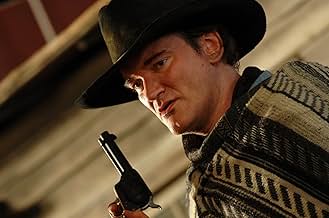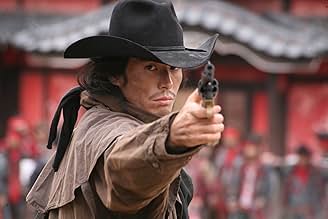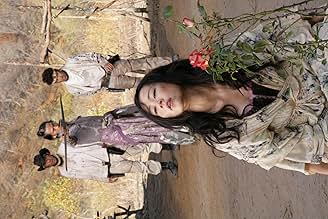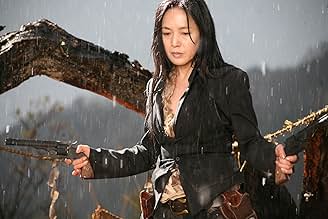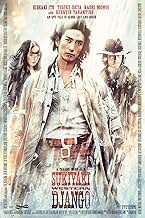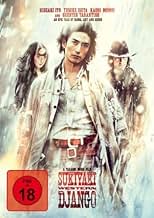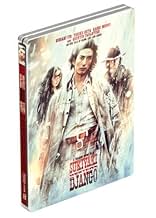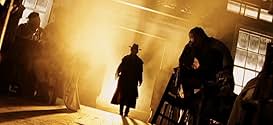AVALIAÇÃO DA IMDb
6,1/10
16 mil
SUA AVALIAÇÃO
Adicionar um enredo no seu idiomaA nameless gunfighter arrives in a town ripped apart by rival gangs and, though courted by both to join, chooses his own path.A nameless gunfighter arrives in a town ripped apart by rival gangs and, though courted by both to join, chooses his own path.A nameless gunfighter arrives in a town ripped apart by rival gangs and, though courted by both to join, chooses his own path.
- Direção
- Roteiristas
- Artistas
- Prêmios
- 4 vitórias e 5 indicações no total
- Direção
- Roteiristas
- Elenco e equipe completos
- Produção, bilheteria e muito mais no IMDbPro
Avaliações em destaque
A strange movie, I must say. But before I go into the movie itself, I feel the need to talk about the case.
That's why I actually bought this movie, originally. Because the case was so...pretty. And Quentin Tarantino's name on it sealed the deal for me. The cover design is so well done and beautiful and artistic and many other synonyms of those, which provides the perfect segue into the movie itself.
It starts out with, of all people, Quentin Tarantino. The background is noticeably fake, a setting sun over the horizon painted onto a backdrop. I was a bit taken aback, at first, and I never really understood why, but I rolled with it. With the first words spoken, however, it became painfully apparent what this movies main problem would be.
You see, despite the fact that almost all of the cast uses Japanese as their primary language (I haven't verified this, but it's pretty obvious), the filmmaker, Takashi Miike, shot the whole thing in English. Thankfully, there are subtitles, but the lack of understandable speech presents a great barrier. It's basically the story of two clans, the Heike, led by Kiyomori/Henry (Kōichi Satō), and the Genji, led by Yoshitsune (Yūsuke Iseya), that are battling over a town for a fabled treasure. A mysterious stranger (Hideaki Ito) rolls into town, much like Clint Eastwood in those old movies that we love oh-so-much. This is a beautifully done movie, with many breathtaking scenes, exciting, lovable characters (for the most part), and plenty of blood and gore. Oh, and a rape, so keep the kiddies away from this one.
That's why I actually bought this movie, originally. Because the case was so...pretty. And Quentin Tarantino's name on it sealed the deal for me. The cover design is so well done and beautiful and artistic and many other synonyms of those, which provides the perfect segue into the movie itself.
It starts out with, of all people, Quentin Tarantino. The background is noticeably fake, a setting sun over the horizon painted onto a backdrop. I was a bit taken aback, at first, and I never really understood why, but I rolled with it. With the first words spoken, however, it became painfully apparent what this movies main problem would be.
You see, despite the fact that almost all of the cast uses Japanese as their primary language (I haven't verified this, but it's pretty obvious), the filmmaker, Takashi Miike, shot the whole thing in English. Thankfully, there are subtitles, but the lack of understandable speech presents a great barrier. It's basically the story of two clans, the Heike, led by Kiyomori/Henry (Kōichi Satō), and the Genji, led by Yoshitsune (Yūsuke Iseya), that are battling over a town for a fabled treasure. A mysterious stranger (Hideaki Ito) rolls into town, much like Clint Eastwood in those old movies that we love oh-so-much. This is a beautifully done movie, with many breathtaking scenes, exciting, lovable characters (for the most part), and plenty of blood and gore. Oh, and a rape, so keep the kiddies away from this one.
Although it has the deceptive appearance of one and has been championed as such by many reviewers, Sukiyaki is not quite as much a spaghetti western love letter like, say, Alex De La Iglesias' 800 BALAS as it is a typically Miike-ian reinterpretation of the genre that borrows from both chambara and spaghetti western yet subscribes to neither. It's much less a remake or reimagining of Sergio Corbucci's original DJANGO, not a prequel, sequel or in any other way narratively connected to the original or the gazillion unofficial cash-ins small-time Italian producers with dollar signs gleaming in their eyes feverishly churned out in its wake.
What first screams for our attention is the kind of east-meets-west melting pot Miike has prepared for our enjoyment. A signpost on the lone gunman's way reads 'Nevada', the actors speak English with heavy and grating Japanese accents, some of them bear katanas and most others six shooters, the shabby ghost town the movie takes place in is distinctly Japanese in its architecture yet ornamented with dead men hanging from the town gate in typical 'far west' fashion, there's a sheriff, short blurbs about samurais, rumors of hidden treasure and a gold rush explained in a flashback.
However Miike is not attempting what many other directors have tried to in the past, that is to transpose occidental concepts, their mentality or filmic tradition to the oriental or the other way around. This is no RED SUN, EAST MEETS WEST, THE MASTER GUNFIGHTER or A FISTFUL OF DOLLARS to name but a few. What he tries and largely succeeds in creating is this alternative 'far west', a grotesque, exaggerated caricature of the American frontier myth seen through Japanese eyes.
A seamless melding of western and chambara that takes place in a distinctly imagined location. In Miike's vision of the genre west, the (historical naval) battle of Dannoura between the Genji and the Heike takes place close to Quentin Tarantino dressed in a poncho playing a gunfighter called Ringo and is followed a couple hundred years later by a signpost that reads Nevada and the Genji and Heike still split into warring factions. If a country had to be named as the setting for Sukiyaki it would be the United States of Nippon in Sukiyaki's universe, there never was any Japan or America to begin with. A sort of RETCON or 'Retroactive Continuity' as it is known is taking place here. Fans of comic books will be familiar with the myth-making idea here.
It's a damn shame then that a movie as conceptually and aesthetically ambitious as Sukiyaki is let down by a terrible script, Miike's ill-advised decision to have all his actors mumble their way through their lines in distracting Engrish and the pace-clogging inclusion of at least thirty minutes of dead running time that should have been mercifully left to die at the cutting room floor.
There are scenes that don't work at all (such as the unnecessary dance scene) and there are scenes that outstay their welcome by a good number of minutes. And they're all strung together in a painfully mediocre pastiche of a script carrying with it a confused and incongruous mood that can't decide whether it wants to be taken serious, laughed at or laughed with. Quasi-philosophical blurbs are married with ill-advised slapstick nonsense, fortune cookie nuggets of wisdom with lame flashbacks and cartoon-esquire action. There's something for everyone here and everything pushing in different directions at once. On one hand Miike seems to go for an air of sentimental and meaningful profundity while at the same time indulging his nuttier side.
The good in Sukiyaki come in the form of a commendable visual attention to detail and beautiful lighting, the blistering action and the comic book vibe he goes for that recalls the days of FUDOH and DEAD OR ALIVE. While not without the macabre touches we've come to expect from him, Sukiyaki is a decidedly commercial action picture, one that will ironically appeal more to Tarantino and Rodriguez fans than devoted spaghetti western or chambara afficionados.
Perhaps emphasizing that last part, Tarantino has a short role as gunfighter extraordinaire Ringo. In the opening scene that supposedly takes place concomitant with the Battle of Dannoura he whacks pistolero-style three badly dressed goons and mouths off a couple of one-liners.
The scene is amusing at best but he has the show stole from right under his nose by the beautiful and intriguing set design and painted backdrops that recreate an oddly poetic and intentionally artificial rendition of the old west, perhaps recalling the dream sequence Akira Kurosawa created for Tatsuya Nakadai to stagger his way through in KAGEMUSHA or the similarly evocative painted sunsets of DODESUKADEN. I wish Miike had returned to that technique again later in the movie. Instead he uses a short anime passage that recalls KILL BILL. The final showdown in the snow is among the highlights of the movie and so is the appearance of a certain coffin and its contents that will have DJANGO fans nodding in approval.
What first screams for our attention is the kind of east-meets-west melting pot Miike has prepared for our enjoyment. A signpost on the lone gunman's way reads 'Nevada', the actors speak English with heavy and grating Japanese accents, some of them bear katanas and most others six shooters, the shabby ghost town the movie takes place in is distinctly Japanese in its architecture yet ornamented with dead men hanging from the town gate in typical 'far west' fashion, there's a sheriff, short blurbs about samurais, rumors of hidden treasure and a gold rush explained in a flashback.
However Miike is not attempting what many other directors have tried to in the past, that is to transpose occidental concepts, their mentality or filmic tradition to the oriental or the other way around. This is no RED SUN, EAST MEETS WEST, THE MASTER GUNFIGHTER or A FISTFUL OF DOLLARS to name but a few. What he tries and largely succeeds in creating is this alternative 'far west', a grotesque, exaggerated caricature of the American frontier myth seen through Japanese eyes.
A seamless melding of western and chambara that takes place in a distinctly imagined location. In Miike's vision of the genre west, the (historical naval) battle of Dannoura between the Genji and the Heike takes place close to Quentin Tarantino dressed in a poncho playing a gunfighter called Ringo and is followed a couple hundred years later by a signpost that reads Nevada and the Genji and Heike still split into warring factions. If a country had to be named as the setting for Sukiyaki it would be the United States of Nippon in Sukiyaki's universe, there never was any Japan or America to begin with. A sort of RETCON or 'Retroactive Continuity' as it is known is taking place here. Fans of comic books will be familiar with the myth-making idea here.
It's a damn shame then that a movie as conceptually and aesthetically ambitious as Sukiyaki is let down by a terrible script, Miike's ill-advised decision to have all his actors mumble their way through their lines in distracting Engrish and the pace-clogging inclusion of at least thirty minutes of dead running time that should have been mercifully left to die at the cutting room floor.
There are scenes that don't work at all (such as the unnecessary dance scene) and there are scenes that outstay their welcome by a good number of minutes. And they're all strung together in a painfully mediocre pastiche of a script carrying with it a confused and incongruous mood that can't decide whether it wants to be taken serious, laughed at or laughed with. Quasi-philosophical blurbs are married with ill-advised slapstick nonsense, fortune cookie nuggets of wisdom with lame flashbacks and cartoon-esquire action. There's something for everyone here and everything pushing in different directions at once. On one hand Miike seems to go for an air of sentimental and meaningful profundity while at the same time indulging his nuttier side.
The good in Sukiyaki come in the form of a commendable visual attention to detail and beautiful lighting, the blistering action and the comic book vibe he goes for that recalls the days of FUDOH and DEAD OR ALIVE. While not without the macabre touches we've come to expect from him, Sukiyaki is a decidedly commercial action picture, one that will ironically appeal more to Tarantino and Rodriguez fans than devoted spaghetti western or chambara afficionados.
Perhaps emphasizing that last part, Tarantino has a short role as gunfighter extraordinaire Ringo. In the opening scene that supposedly takes place concomitant with the Battle of Dannoura he whacks pistolero-style three badly dressed goons and mouths off a couple of one-liners.
The scene is amusing at best but he has the show stole from right under his nose by the beautiful and intriguing set design and painted backdrops that recreate an oddly poetic and intentionally artificial rendition of the old west, perhaps recalling the dream sequence Akira Kurosawa created for Tatsuya Nakadai to stagger his way through in KAGEMUSHA or the similarly evocative painted sunsets of DODESUKADEN. I wish Miike had returned to that technique again later in the movie. Instead he uses a short anime passage that recalls KILL BILL. The final showdown in the snow is among the highlights of the movie and so is the appearance of a certain coffin and its contents that will have DJANGO fans nodding in approval.
Sukiyaki Western Django (2007)
** (out of 4)
Quentin Tarantino in a Takashi Miike homage to Spaghetti Westerns is going to be enough to get a few curious people to watch but I must rip off a few reviews I've read, which called this film different but not very entertaining. In what's basically a remake of Akira Kurosawa's Yojimbo, a mysterious gunfighter (Ito Hideaki) with no name shows up and plays two rival gangs against one another. If someone was to call this the greatest movie ever made I honestly wouldn't argue with them. I'm sure many are going to watch this film and consider it a masterpiece and I would respect their opinion just about as much as I respect Miike for trying something like this. However, the movie just didn't work for me. This is basically an incredibly bizarre homage to countless Westerns done in a way that Tarantino pays homage to various genres in this country but I might go a step further and say Miike is much more original than Tarantino has ever been. I think this film, for what it is, is incredibly original and at times visually brilliant but as much credit as I give to Miike I have to give him just as much blame. For some reason he felt it would be a good idea to have the Japanese actors speak English, which was a deadly mistake. Sure, this adds a surreal nature to the film but the problem is that a lot of the times you can't understand what they're saying. This film is full of dialogue and when you can't understand a quarter of it then you're going to be in trouble. This also effects the performances as the spoken dialogue is just as bad as watching a dubbed Kurosawa film. As is to be expected, the movie is full of violence but most of it is done in a comical way and that includes one man getting shot up while his wife holds his dying body. Tarantino doesn't add too much to the film either. In the end this is a film I highly respect but there's just no way I will ever find myself watching it again.
** (out of 4)
Quentin Tarantino in a Takashi Miike homage to Spaghetti Westerns is going to be enough to get a few curious people to watch but I must rip off a few reviews I've read, which called this film different but not very entertaining. In what's basically a remake of Akira Kurosawa's Yojimbo, a mysterious gunfighter (Ito Hideaki) with no name shows up and plays two rival gangs against one another. If someone was to call this the greatest movie ever made I honestly wouldn't argue with them. I'm sure many are going to watch this film and consider it a masterpiece and I would respect their opinion just about as much as I respect Miike for trying something like this. However, the movie just didn't work for me. This is basically an incredibly bizarre homage to countless Westerns done in a way that Tarantino pays homage to various genres in this country but I might go a step further and say Miike is much more original than Tarantino has ever been. I think this film, for what it is, is incredibly original and at times visually brilliant but as much credit as I give to Miike I have to give him just as much blame. For some reason he felt it would be a good idea to have the Japanese actors speak English, which was a deadly mistake. Sure, this adds a surreal nature to the film but the problem is that a lot of the times you can't understand what they're saying. This film is full of dialogue and when you can't understand a quarter of it then you're going to be in trouble. This also effects the performances as the spoken dialogue is just as bad as watching a dubbed Kurosawa film. As is to be expected, the movie is full of violence but most of it is done in a comical way and that includes one man getting shot up while his wife holds his dying body. Tarantino doesn't add too much to the film either. In the end this is a film I highly respect but there's just no way I will ever find myself watching it again.
Reading some of the reviews, I am surprise that others are confused as to the story. It is basically a samurai movie made as a Japanese western with Japanese cowboys instead of samurais. The story is almost the same as Yojimbo/A Fistfull of dollars. Stranger comes into town and gets the 2 opposing gangs to start killing each other. The difference being he has a sidekick in the kick ass Bloody Benten (female gunslinger). I think what makes everyone go "huh?" is its rather confusing opening with Quentin Tarantino and also the dialogue in heavily Japanese accented and enunciated English. It is rather jarring and does distract from the story. However if you have watched enough undubbed samurai movies you will be familiar with the style and delivery of the dialogue so the distraction goes away. The movie is nothing original but based on it simply being a gunfight movie its not bad.
Another Mikke Takeshi film - so expect the unexpected - or maybe not.
There is a serious problem to this film which most reviews haven't even touched. Yet anyone who has followed direct-to-video action films from Japan for the past 20 years should know what it is. Post-modern references to Spaghetti Westerns have become such a staple of such films, that these essentially have established a genre all their own - absurdist over the top violence, operatic story elements, musical and visual cues referencing the music of Ennio Morricone and the films of Sergio Leone - This has now been done a hundred times. This is the real surprise (disappointment) of the present movie - it is not new.
The reason for the development of this weirdly self-referential genre is that the most famous of all Spaghetti Westerns, Leone's 'A Fistful of Dollars,' was a direct rip-off of Akira Kurosawa's 'Yojimbo.' In the past two decades, Japanese film makers have tried to understand how that could happen. In general, although producing entertaining action films, they have failed miserably to comprehend the relationship between "Fistful" and "Yojimbo," because they haven't been able to grasp the fundamental agreement between the thought of Leone and Kurosawa which was softly Marxist in social orientation. Both of the original films are quietly but rigorously condemnatory of modern capitalism, which has been lost on the Japanese genre in question.
One would have expected director Miike Takeshi, who has been so critical of modern society in other films, to have recognized this and used it. He does not. SWD is entirely of its genre, and nothing new is learned from it.
Instead, he tries to avoid the issue by drawing his material mainly from the major film by Leone disciple Sergio Corbucci - "Django." Big mistake.
Whatever its merits, 'Django' left one seriously misguided impression on the history of the Spaghetti Western - it seems to be entirely lacking in humor. Althgough Corbucci later revealed quite a sense of the comedic, and Leone's own films are largely comedies with operatic structures, this impression of 'Django' has stuck, and most parodies of Spaghetti Westerns have been based on the assumption that the genre is overly heavy in its themes and philosophy. Nothing could be further from the truth.
Yet here, we are expected to laugh because the characters take themselves sssooo seriously. When the heroes of the best Spaghetti Westerns didn't take themselves seriously at all. Which means we are expected to laugh at a parody of a genre that in fact never existed.
There's a lot of good here. The action sequences are solid, the pacing is good, the weird blend of Meji Restoration and 1880s cowboy actually works visually. And there are lines from the dialog that are impossible to forget.
But those familiar with Japanese action films have seen most of this before. And we expect more from this unique director, especially with the budget involved.
There is a serious problem to this film which most reviews haven't even touched. Yet anyone who has followed direct-to-video action films from Japan for the past 20 years should know what it is. Post-modern references to Spaghetti Westerns have become such a staple of such films, that these essentially have established a genre all their own - absurdist over the top violence, operatic story elements, musical and visual cues referencing the music of Ennio Morricone and the films of Sergio Leone - This has now been done a hundred times. This is the real surprise (disappointment) of the present movie - it is not new.
The reason for the development of this weirdly self-referential genre is that the most famous of all Spaghetti Westerns, Leone's 'A Fistful of Dollars,' was a direct rip-off of Akira Kurosawa's 'Yojimbo.' In the past two decades, Japanese film makers have tried to understand how that could happen. In general, although producing entertaining action films, they have failed miserably to comprehend the relationship between "Fistful" and "Yojimbo," because they haven't been able to grasp the fundamental agreement between the thought of Leone and Kurosawa which was softly Marxist in social orientation. Both of the original films are quietly but rigorously condemnatory of modern capitalism, which has been lost on the Japanese genre in question.
One would have expected director Miike Takeshi, who has been so critical of modern society in other films, to have recognized this and used it. He does not. SWD is entirely of its genre, and nothing new is learned from it.
Instead, he tries to avoid the issue by drawing his material mainly from the major film by Leone disciple Sergio Corbucci - "Django." Big mistake.
Whatever its merits, 'Django' left one seriously misguided impression on the history of the Spaghetti Western - it seems to be entirely lacking in humor. Althgough Corbucci later revealed quite a sense of the comedic, and Leone's own films are largely comedies with operatic structures, this impression of 'Django' has stuck, and most parodies of Spaghetti Westerns have been based on the assumption that the genre is overly heavy in its themes and philosophy. Nothing could be further from the truth.
Yet here, we are expected to laugh because the characters take themselves sssooo seriously. When the heroes of the best Spaghetti Westerns didn't take themselves seriously at all. Which means we are expected to laugh at a parody of a genre that in fact never existed.
There's a lot of good here. The action sequences are solid, the pacing is good, the weird blend of Meji Restoration and 1880s cowboy actually works visually. And there are lines from the dialog that are impossible to forget.
But those familiar with Japanese action films have seen most of this before. And we expect more from this unique director, especially with the budget involved.
Você sabia?
- CuriosidadesThe background for the artificial set in the prologue is clearly inspired by the woodblock prints "Gaifu Kaisei" and "Sanka Haku" featured in Hokusai's famous "Thirty Six Views of Mount Fuji" series.
- Erros de gravaçãoIn the final scene, the Gunman goes from having a mustache and goatee to being clean shaven between shots.
- Versões alternativasThe international cut version, shorter by 23 minutes, omits several scenes for pacing reasons and also all the scenes where the big Genji/Minamoto henchman after having his balls shot off develops a crush for his leader Yoshitsune. This version was screened at several film festivals and is featured on most of the DVD releases outside of Japan.
- ConexõesReferenced in Film Junk Podcast: Episode 194: Quantum of Solace (2008)
- Trilhas sonorasDjango ~Sasurai~
Performed by Saburô Kitajima
Written by Makoto (as MAKOTO°), Franco Migliacci and Robert Mellin
Composed by Luis Bacalov (as Luis Enrique Bacalov)
Arranged by Eiji Kawamura
Principais escolhas
Faça login para avaliar e ver a lista de recomendações personalizadas
Detalhes
Bilheteria
- Orçamento
- US$ 3.800.000 (estimativa)
- Faturamento bruto nos EUA e Canadá
- US$ 50.659
- Fim de semana de estreia nos EUA e Canadá
- US$ 9.856
- 31 de ago. de 2008
- Faturamento bruto mundial
- US$ 2.725.258
- Tempo de duração
- 2 h 1 min(121 min)
- Cor
- Mixagem de som
- Proporção
- 2.35 : 1
Contribua para esta página
Sugerir uma alteração ou adicionar conteúdo ausente







